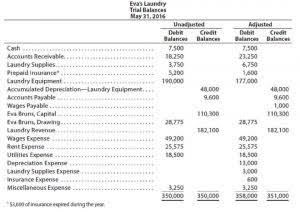Content

How the introductory language in the illustrative example of the new section in the auditor’s report could be drafted to clearly explain to users that the matters discussed in the auditor’s report is not intended to be a comprehensive list of all matters discussed with those charged with governance. The European Commission currently has efforts underway to reform audit policy arising from lessons from the global financial crisis including proposed regulation and directives that address in part the content of public auditors’ reports as well as auditors’ reports to audit committees. The accompanying financial statements have been prepared assuming that the Company will continue as a going concern. As discussed in Note to the financial statements, the Company has suffered recurring losses and has a net capital deficiency. These conditions raise substantial doubt about its ability to continue as a going concern. The financial statements do not include any adjustments relating to the recoverability and classification of asset carrying amounts or the amount and classification of liabilities that might result should the Company be unable to continue as a going concern.

The first/ introductory paragraph states the work done and the responsibilities of the auditing firm and the audited company management, whereas the second paragraph is the scope; states the set of accounting standard practices referenced to for guidelines. audit report.Annually provide the SELPA with the LEA’s annual, independent financial audit report, on or before December 20th each year, unless an extension has been granted by the State Controller’s Office, in which case an extension will be granted to the charter as well. LEA further agrees to provide SELPA copies of any and all State Controller’s Office communications regarding audit report corrective actions and a corrected audit report, if applicable.
Office of Financial Management
They may not have been able to decipher the correct nature of some transactions or to secure enough evidence to support good financial reporting. Auditors that aren’t allowed an opportunity to observe operational procedures or to review particular procedures may feel like they’re not able to express a definite opinion, so they feel a disclaimer is necessary and in order. The general consensus is that a disclaimer of opinion constitutes a very harsh stance. Often called a clean opinion, an unqualified opinion is an audit report that is issued when an auditor determines that each of the financial records provided by the small business is free of any misrepresentations.
- Limitation of scope – this type of qualification occurs when the auditor could not audit one or more areas of the financial statements, and although they could not be verified, the rest of the financial statements were audited and they conform to GAAP.
- Readers should understand that these reports are covered by the immunities set out in theConvention on the Privileges and Immunities of the United Nations, 1946, and other relevant instruments; and that those immunities are not waived and are expressly reserved.
- The Office of Policy and Management’s Electronic Audit Reporting System allows state agencies and the public to view and access audit reports that have been filed with OPM.
- Audit is critical function to provide objective assurance on the integrity and credibility of the Organization.
If the auditor agrees that initiatives suggested by management may strengthen operations, the auditor may choose to include management’s ideas in the management letter. Management may also identify for the auditor areas that may need further, independent corroboration in order for the board to fully appreciate the ramifications of their decisions. Unqualified OpinionAn unqualified opinion is concluded by an auditor appointed by the company after making substantial procedures to check the policies and procedures in place and collected optimum evidence that the organization does not include any material discrepancies or misstatements. It is the most common opinion given by the auditors and always expected by the auditee. In this type of audit report, the advice given by the auditor will be unqualified, without any adverse comments or any disclaimer about any clauses or process. As per the auditor, by this report, they are satisfied with the company’s performance and finding its functions in sync with governance and applicable statute. Those matters that, in the auditor’s professional judgment, were of most significance in the audit of the financial statements of the current period.
Nonprofit Audit Guide
An audit involves performing procedures to obtain audit evidence about the amounts and disclosures in the consolidated financial statements. The procedures selected depend on the auditors’ judgment, including the assessment of the risks of material misstatement of the consolidated financial statements, whether due to fraud or error.
- The IAASB also agreed to continue to explore auditor reporting on going concern.
- It is important to note that auditor reports on financial statements are neither evaluations nor any other similar determination used to evaluate entities in order to make a decision.
- The ASB has also modified its standards and made other changes that will affect audit practice in the areas of potential fraud, communications, related party transactions, going concern, and other subjects.
- However, following the boiler room operation of the 1920s and subsequently the stock market crash of 1929 there was a need to safeguard investors.
- A disclaimer of opinion means that, for some reason, the auditor is unable to obtain sufficient audit evidence on which to base the opinion, and the possible effects on the financial statements of undetected misstatements, if any, could be both material and pervasive.
Join Glass Lewis and Diligent, August 3rd, in a discussion about the top trends from the 2022 proxy season, and what governance professionals and boards can do to translate these insights into action. Streamline your next board meeting by collating and collaborating on agendas, documents, and minutes securely in one place. 25See paragraphs .08 and .12–.15 of AS 2820, Evaluating Consistency of Financial Statements. 24See paragraphs .06–.09 of AS 1205, Part of the Audit Performed by Other Independent Auditors.
AU-C 705—Modifications to the Opinion in the Independent Auditor’s Report
The list below shows all reports that are disclosed to the public in line with this Policy. Proposed ISA 706 , Emphasis of Matter Paragraphs and Other Matter Paragraphs in the Independent Auditor’s Report – Amended to clarify the relationship between Emphasis of Matter paragraphs, Other Matter paragraphs and the KAM section of the auditor’s report. Proposed ISA 260 , Communication with Those Charged with Governance – Amended required auditor communications with those charged with governance, including proposed communication about the significant risks identified by the auditor, in light of proposed ISA 701. Proposals to clarify the auditor’s responsibilities by describing the risk-based audit approach under the ISAs, and clarification of other technical terms in the auditor’s report. The IAASB also deliberated disclosure of the engagement partner’s name in the auditor’s report.

During and after the audit, audit committees evaluate the auditors’ performance and recommend to the board whether to retain the same firm for next year’s audit or whether to engage a new one. Therefore, it is imperative that the audit committee is diligent in evaluating the auditors. The audit committee should consider a number of questions about its relationship with the independent auditor and should also engage the nonprofit’s key executives for their comments.
Nonprofit Impact Matters
The Single Audit is a comprehensive financial statement and federal awards audit which must be completed by the State of Washington each year. The Single Audit is performed to ensure the State uses its federal funds appropriately and is in compliance with all applicable requirements and regulations of each grant award.
What is audit risk formula?
Audit risk can be calculated as: AR = IR × CR × DR.
An auditor is a person authorized to review and verify the accuracy of business records and ensure compliance with tax laws. An additional paragraph may inform the investor of the results of a separate audit on another function of the entity. The WHO External Auditor is the Auditor-General of a Member State appointed by and reporting to the Health Assembly. The term of office is four years, and can be extended once, by the Health Assembly, for an additional four years. Most companies cannot afford the big four auditing firm to do their audit and may hire other firms with limited resources in terms of qualified personnel and therefore bringing to question the quality of the audit.
Understanding the Four Types of Audit Reports
Depending on the type of qualification, the phrase is edited to either state the qualification and the adjustments needed to correct it, or state the scope limitation and that adjustments could have but not necessarily been required in order to correct it. We have audited the accompanying financial statements of ABC Company, Inc. , which comprise the balance sheet as of December 31, 20XX, and the related statements of income, retained earnings, and cash flows for the year then ended, and the related notes to the financial statements. On the basis of the results of their annual audits, the ECA provides the European Parliament and the Council with a statement of assurance as to the reliability of each EU agency’s accounts and the legality and regularity of the underlying transactions, including observations where appropriate, with a view to the discharge procedure. 16The terms used in the Opinion on the Financial Statements section, such as financial position, results of operations and cash flows, should be modified, as appropriate, depending on the type of company and financial statements being audited. 5 The auditor should look to the requirements of the SEC for the company under audit with respect to the accounting principles applicable to that company.
- As a responsible professional, the auditor can attract the public’s attention about any non-acceptable approach the companies accept.
- An Adverse Opinion is issued when the auditor determines that the financial statements of an auditee are materially misstated and, when considered as a whole, do not conform with GAAP.
- How proposed ISA 701 should best reflect the IAASB’s view that the auditor’s judgment of what to report externally is derived from what had been communicated with those charged with governance, and whether any clarifications are needed to the requirements or guidance in ISA 260, Communication with Those Charged with Governance.
- Audit Report.Annually provide the SELPA with the LEA’s annual, independent financial audit report, on or before December 20th each year, unless an extension has been granted by the State Controller’s Office, in which case an extension will be granted to the charter as well.
- Companies seeking funding, as well as those looking to improve internal controls, also find this information valuable.
- When the financial statements are materially misstated due to misstatement in one particular account balance, class of transaction or disclosure that does not have pervasive effect on the financial statements.
Beginning in 2002, many countries have tasked the audit committee with primary responsibility over the audit. For example, in the United States, section 204 of the Sarbanes-Oxley Act passed in 2002 required auditors to communicate certain information to audit committees, which were required to be entirely independent, and also made the audit committee responsible for the auditor’s hiring. Public Company Accounting Oversight Board finalized Auditing Standard No. 16, which requires additional communications to the audit committee. The report consists of a title and header, a main body, the auditor’s signature and address, and the report’s issuance date.
The Reporting Package filed on EARS normally includes the Federal Single https://www.bookstime.com/ if a federal single audit was conducted. Including the Federal Single Audit report as part of the reporting package filed on EARS eliminates the need to submit copies of the report to the various state agencies that may seek the report if it is not filed on EARS. 393 of the General Statutes provides that a copy of the audit report shall be filed with the Secretary at the same time it is filed with local officials, and that such copy shall be filed within six months from the end of the fiscal year of the auditee. Connecticut General Statutes require that the appointing authority of a municipality, audited agency, regional school district and tourism district , notify the Secretary of the Office of Policy and Management of the independent auditor appointed to perform the audit. AU-C 706 continues past practice of placing an emphasis-of-matter paragraph or other-matter paragraph in the audit report.
What is importance of audit report?
The auditor report provides a thorough reference to all the inefficiencies in business in financial transactions. It also provides information to the shareholders or the company owner about the integrity of management to the company and the shareholders.
Qualified Opinion SectionThe company’s auditor issues a qualified opinion in the audit report if it is found that the company’s financial statements are presented fairly, but with exceptions in specific areas. It is one level below a Unqualified Opinion (i.e. Clean Opinion) and is given when the Auditor believes the financial statement has not been prepared in accordance with the rules laid down under the provisions of GAAP or IFRS. The IAASB also discussed issues related to auditor reporting on going concern, including revised wording to be included in the illustrative auditor’s report. The IAASB agreed to undertake limited amendments to ISA 570, while further monitoring the activities of accounting standards setters relating to going concern in order to determine whether there is a need for more extensive revisions to ISA 570 at a later date. Going concern is a term which means that an entity will continue to operate in the near future which is generally more than next 12 months, so long as it generates or obtains enough resources to operate. If the auditee is not a going concern, it means that the entity might not be able to sustain itself within the next twelve months. Auditors are required to consider the going concern of an auditee before issuing a report.
